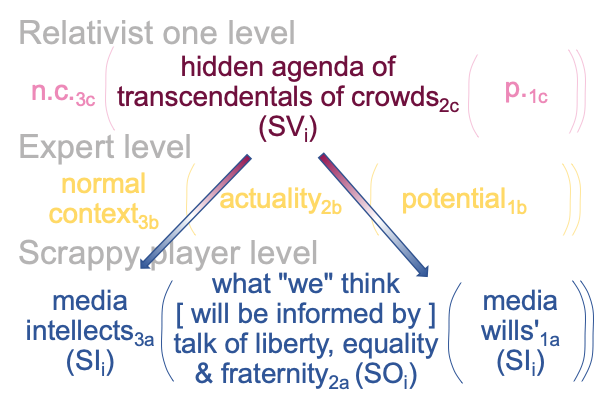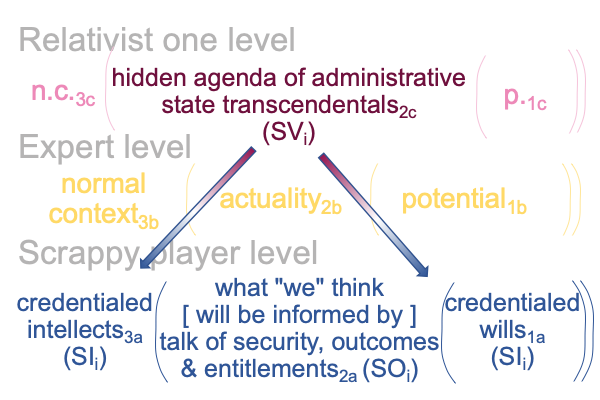0547 In chapter three, Stiles recalls Noam Chomsky’s book (1988), Manufacturing Consent. Chomsky tells the story of Walter Lippmann (1889-1974), adored as the most influential journalist of the 20th century and regarded as the father of modern journalism. Lippmann wrote books disparaging the public at large, questioning their ability to function as intelligent members of society. In short, people are too stupid for democracy.
0548 Still, people love the word, “democracy”.
Perhaps, the elites may script a self-serving fiction about “democracy”, where “democracy” empowers the elites in an Age of Crowds, because the elites represent the common folk.
We must protect “our democracy”, from everyone who does not buy into elite narratives.
0549 Democracy never appeals to logic. Democracy entices crowds with images and parables. Democracy presents simple slogans that crystallize into manufactured “truths”. Democracy exposes the ambitions of its opponents, while presenting what seems to be madness, wrapped in slogans promoting liberty, equality and fraternity. Democracy works miracles, demonstrating its authority. Those who promote democracy with donations of, say, $100,000,000, ask folk to enter the kingdom, then smile as the sheep build their own corral.
0550 What is necessary to define the word, “democracy”?
The experts will tell.
0551 The first amendment enshrines freedom of the press. But, what is freedom? Is the press free to call upon experts funded by the private Rockefeller Foundation in the support of public legislation, which will be passed by senators, who are now directly elected by the citizens of each state? Do those citizens buy into the concept of “our democracy”? Are those citizens subject to the techniques of crowd management?
Is “freedom of the press” now “the liberty to spread values determined by highly educated… er… credentialed experts”?
0552 In 1919, Upton Sinclair writes The Brass Check: A Study in American Journalism: Evidence and Reason Behind The Media’s Corruption.
In 1922, Walter Lippmann publishes his masterwork, Public Opinion, arguing that experts are necessary to sift through complex data (observations and measurements of phenomena) in order to guide the masses to the optimum decisions.
Surely, a citizen of the original thirteen colonies would applaud Upton Sinclair for his honesty.
Surely, a citizen in the Age of Crowds would follow Lippmann’s argument because expert reviewers extol Lippmann’s appeal to reason3a,1a, where the intellect3a contextualizes the will1a and the will1a has no desire for truth.
0553 What does the will1a desire?
In the Age of Crowds, the will1a does not desire timeless transcendentals, such as truth, beauty, wisdom, salvation, friendship, and so on. The will1a desires “the transcendentals” of crowds: liberty, equality and fraternity.
Almost twenty years before the Second Battle of the Enlightenment Gods, the Hot War Among Fraternal Ideologies(1938-1945), Sinclair celebrates a new age of fraternity, trying to be born. Sinclair says that the press ought to assist the birth. Instead, the press insists on killing the child in the womb.
0554 Little does Sinclair know that the demon-gods of the hot war among fraternal ideologies incubate in-vitro in the crib of what the press fails to say and who the press is beholden to.

0555 Lippmann’s vision is further refined during the Third Battle of the Enlightenment Gods: The Cold War Among Materialist Ideologies (1945-1989). Ownership of broadcasting media (radio and television) consolidates. The Central Agency for Intelligence initiates a systemic infiltration of corporate media.
There is resistance. Stiles presents a list of whistleblowers spanning from 1908 to 2020.
0556 By the start of the Fourth Battle of the Enlightenment Gods: Empirio-normative Domination of Subject Populations in the Post-Truth Condition (1989 to present), corporate media and government collaborate. Experts infiltrate every American institution.
According to Stiles, intentional biases and outright deception replace the quest for truth3a,1a.
Yes, such may be the case. But, the suggestion can be made for a transformation of the hidden agenda (SVi) that no one can see, but everyone knows is there. What else would explain (SIi) what we think and see (SOi)?
0557 Here is a picture.

